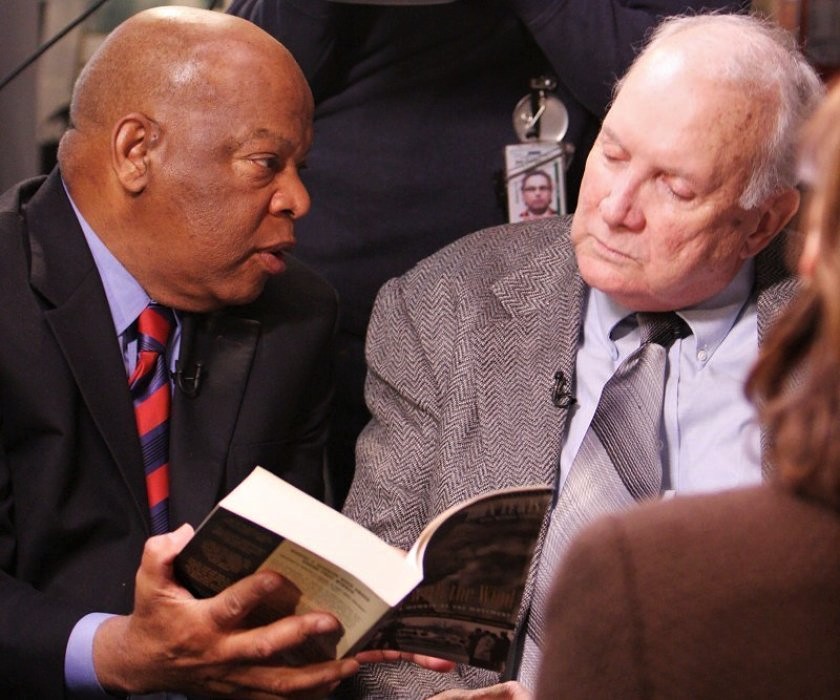Three exemplary Americans died in less than a year.

Three Americans taught us the importance of commonality: Congressman Elijah Cummings; Congressman John Lewis; and Rev. Cordy Tindell “C.T.” Vivian.
All three were stalwart civil rights leaders. All three advocated the message of Reverend Dr. Martin Luther King Jr.: “Injustice anywhere is a threat to justice everywhere.” All three, and thousands like them, put their lives on the line for that message.
With the death of John Lewis we have lost a giant in social reform. Is it any wonder he was referred to as the conscience of Congress? Speaking on the Voting Rights Act in 2019, his message was clear. “Voting access is the key to equality in our democracy. The size of your wallet, the number on your Zip code shouldn’t matter.”
However, Lewis’s death was a reminder of another message.
In 1961, two men met at a bus stop in Rock Hill, South Carolina. Lewis was part of a group of Freedom Riders traveling around the country by bus fighting segregation. As the Rock Hill Herald’s John Mcfadden reported:
“On May 9, [Lewis] and his seatmate on the bus, a white man named Albert Bigelow, walked into the whites-only waiting room at the Rock Hill bus station. They were jumped by a group of young white men, who beat them and left them bloodied, Lewis said.”
Elwin Wilson, a Ku Klux Klan racist, was one of those who attacked and beat Lewis.
Forty-six years later, the two met under different circumstances. Wilson was there to apologize. Lewis was there to forgive.
“I just told him that I was sorry,” Wilson told the Associated Press, adding that he had tried for years to erase the memory of that incident, but “couldn’t do it.”
“He said he had it on his heart for a long time,” Wilson’s wife, Judy said. “He said he wished he could find the ones he mistreated and apologize to them all.”
“I was very moved,” Lewis said. “He was very, very sincere, and I think it takes a lot of raw courage to be willing to come forward the way he did. … I think it will lead to a great deal of healing.
“His story is a powerful story; his story must not be forgotten,” Lewis told The Herald. “His story and the way he arrived at his position must be understood, must be told.
“He was the first private citizen. He was the very, very first to come and apologize to me,” Lewis said, “for a private citizen to come along and say, ‘I’m the one that attacked you; I’m the one who beat you.’ It was very meaningful,” The Christian Science Monitor reported in 2013.
“In 2009, Lewis and Wilson accepted the Common Ground Award for Reconciliation at the Canadian Embassy in Washington, D.C.,” The Monitor added. “Also that year, both were honored in California with awards on Worldwide Forgiveness Day. In Maryland, Wilson presented Lewis with an award.”
“If just one person comes forward,” Wilson said, “and gets the hate out of their heart, it’s all worth it, but I hope there will be a bunch of people. Life’s short and we all go to the same place when we die.”
Elijah Cummings, who came from a family of sharecroppers and Baptist preachers, was, at times, the fiery congressman from Baltimore, Maryland known for his principled stands in the House.
Addressing people at the funeral for Freddy Gray who died from injuries suffered when he was not properly secured while being transported by police in a van, Cummings said, “I’ve often said, our children are the living messages we send to a future we will never see, but now our children are sending us to a future they will never see! There’s something wrong with that picture,” The Washington Post reported, (Oct. 17, 2019).
“When looting began, hours after the funeral,” The Post wrote, “Mr. Cummings rushed, bullhorn in hand, to a troubled West Baltimore neighborhood, where he worked to restore order and to assure residents that authorities were taking the case seriously. (Six officers would be charged in Gray’s death, although prosecutors failed to secure a conviction against any of them.)”
Cordy Tindell worked alongside the Martin Luther King and took part in the first non-violent protest in Peoria, Illinois.
“By 1965,” CNN observed (July 18), “Vivian had become the director of national affiliates for the Southern Christian Leadership Conference when he led a group of people to register to vote in Selma, Alabama. As Sheriff Jim Clark blocked the group, Vivian said in a fiery tone, ‘We will register to vote because as citizens of the United States we have the right to do it.’ Clark responded by beating Vivian until blood dripped off his chin in front of rolling cameras. The images helped galvanize wider support for change.”
Vivian founded the “Center for Democratic Renewal because the whole culture had to be renewed if it truly was going to be a democratic one.”
As a result of the moral clarity of these three men, change began to take place. All three taught us the lessons necessary to move forward, as John Lewis described in a speech last December: “freedom, equality, and basic human rights.”
Comments
Leave a Comment











A great review and reminder of:
“freedom, equality, and basic human rights.”